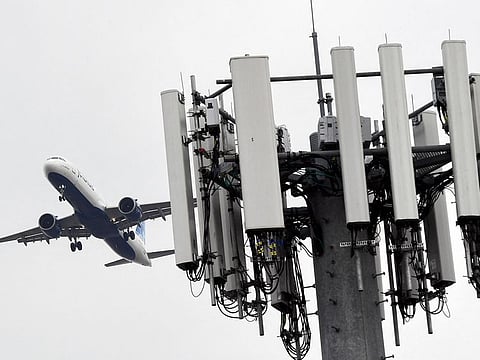5G rollout brings minor travel disruptions only in US as regional airlines await FAA approval
New deal appears to avert travel disruptions that airline executives warned earlier

Washington: The rollout of new 5G networks in cities across the country brought only minor travel disruptions Wednesday, even as regional airlines continued to wait for clearance to use smaller planes during bad weather in parts of the country where interference could affect safety gear.
Major airlines had warned of the potential for disruptions, while some international carriers had canceled flights Wednesday into the United States. But the White House-brokered deal struck on the eve of the 5G rollout to limit deployment near airports appeared to avert travel disruptions that airline executives warned about earlier in the week.
Flight data firm FlightAware listed about 300 canceled flights, a decline from recent days.
The temporary deal - which still allowed 90% of the 5G network to come online - also appeared to reduce frustrations around an issue that had pitted airlines against two telecom giants, and left the Federal Communications Commission at odds with the Federal Aviation Administration.
Concerns on C-band interference with altimeters
The new 5G service uses airwaves known as the C-band. They are close to the spectrum used by devices on aircraft called radio altimeters, leading to concerns about interference. Altimeters provide precise measurements of a plane's altitude and are critical when landing in bad weather with poor visibility.
The FAA said Wednesday it had approved the use of three additional types of altimeters in areas near 5G towers and appeared to have resolved outstanding issues with Boeing's 777 jets, which had led to the international flight cancellations. The FAA said 62% of jets in the US commercial fleet are cleared for low-visibility landings in places where interference could be an issue.
The FAA has approved the use of aircraft from Boeing and Airbus, but it said Wednesday it is still reviewing testing data for altimeters used in regional jets that connect to major hubs.
The limits on 5G deployments and the FAA approvals meant little interruption at larger airports across the country but left regional airlines waiting for approval to use smaller planes during times of low visibility. Faye Malarkey Black, president and chief executive of the Regional Airline Association, said regional carriers account for 43% of US departures, mainly serving smaller airports.
She said while the White House and Department of Transportation are acting to protect aviation, they "have really overlooked a wide swath of the industry."
"The only reason we're not seeing terrible chaos is thanks to fair weather in much of the nation," Black said. "If there's weather, that's a huge problem and it's not a problem felt evenly. It's been resolved in urban centers, but remains very much in place in smaller communities, mostly rural and remote communities."
Black said one of her biggest concerns is what could happen if there is not an acceptable workaround for some types of aircraft.
AT&T, Verizon pause some new 5G after airlines raise alarm
AT&T and Verizon will delay launching new wireless service near key airports after the nation's largest airlines said the service would interfere with aircraft technology and cause widespread flight disruptions. The decision from the companies came Tuesday as the Biden administration intervened to broker tried to broker a settlement between the telecoms and airlines over a rollout of new 5G service. The companies said they will launch 5G or fifth-generation service Wednesday, but they will delay turning on 5G cell towers within a 2-mile radius of runways designated by federal officials. They did not say how long they would keep those towers idle. - AP
Some international carriers that had canceled US-bound flights Wednesday said they planned to resume normal operations after receiving safety assurances from U.S. regulators.
Japan Airlines told customers "we have received confirmation from the FAA that there is no longer a problem with the operation of the Boeing 777" and said it would resume flying its 777s to the United States on Thursday. ANA, another Japanese airline, said it would follow suit.
But at least one international carrier, Emirates, held off immediately resuming all flights.
Emirates suspends some flights
On Tuesday, the Dubai-based airline announced it was suspending flights to nine US cities, including Chicago, San Francisco and Dallas-Fort Worth. However, the carrier said it would continue to operate service to Los Angeles International, John F. Kennedy International in New York and Washington's Dulles International.
By Wednesday, the carrier said it was restoring service to three additional cities - Boston, Houston and San Francisco.
"We are working closely with aircraft manufacturers and the relevant authorities to alleviate operational concerns, and we hope to resume our US services as soon as possible," the carrier said in a note on its website.
Domestic airlines face disruptions
Major domestic airlines reported few problems Wednesday. United Airlines said it expected "minor disruptions at some airports due to the remaining 5G restrictions."
Morgan Durrant, a spokesman for Delta Air Lines, said the carrier had not encountered problems by Wednesday afternoon.
In a memo to staff, American Airlines Chief Operating Officer David Seymour said the carrier had canceled four flights and experienced some delays. There were more cancellations in the airline's regional operation, he said.
Sign up for the Daily Briefing
Get the latest news and updates straight to your inbox



